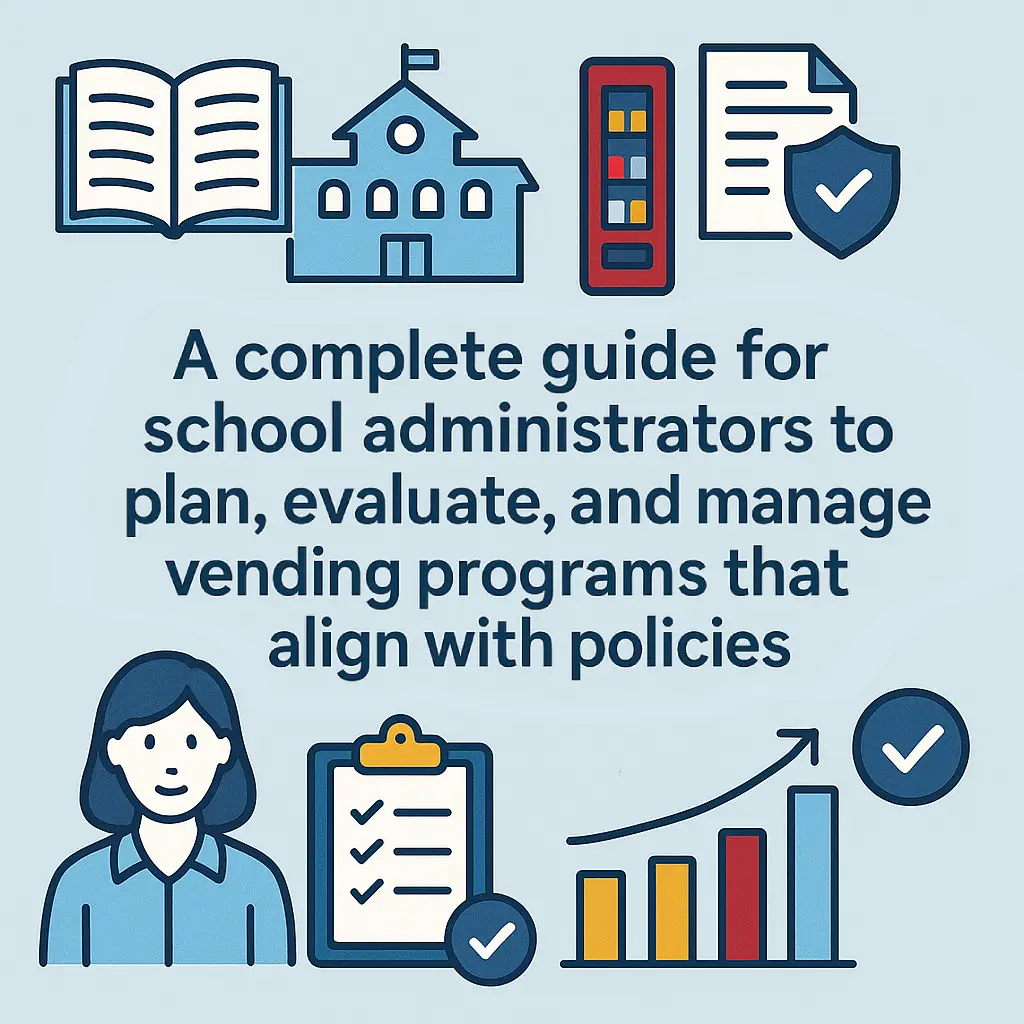School Administrator Guide to Vending
A complete guide for school administrators to plan, evaluate, and manage vending programs that align with policies.
Back to Vending for Schools ResourcesA complete guide for school administrators to plan, evaluate, and manage vending programs that align with policies.
Back to Vending for Schools ResourcesToday’s vending machines support school wellness policies through healthy inventory plans, smart portioning, and compliance monitoring. Admins can select vendors who offer nutritious snack and beverage options tailored to district guidelines, while remote monitoring ensures machines stay stocked and functional.
![]() Smart vending supports compliance with school nutrition standards
Smart vending supports compliance with school nutrition standards
![]() Touchless payment options simplify usage for students and staff
Touchless payment options simplify usage for students and staff
![]() Reliable vendors reduce service complaints and maintenance issues
Reliable vendors reduce service complaints and maintenance issues

School administrators often face the challenge of offering convenient food and beverage choices while maintaining compliance with nutrition standards and student wellness policies. A well-run vending program can enhance accessibility to better choices without burdening staff or stretching district budgets. This guide explains how school officials can evaluate, implement, and manage vending services effectively.
The first step is choosing the right equipment and vendor. Most schools benefit from combo machines that include both snacks and beverages in a single unit. These machines save space and provide more variety. Options like glass-front coolers or smart AI vending units allow for better product visibility and detailed usage reports. For larger campuses, micro markets offer expanded healthy selections and self-checkout convenience.
Administrators should work with vendors that understand school compliance, including USDA Smart Snacks in School guidelines. A strong vendor will provide health-forward inventory plans, rotate stock to avoid expired items, and use real-time tracking systems that flag issues like product sell-outs or malfunctioning machines.
Payments also play a role. Students and staff prefer contactless payments—including mobile wallets and card readers—making machines faster and safer to use. Vendors should provide machines with up-to-date payment technologies to encourage adoption and reduce cash handling.
To minimize involvement from school staff, many administrators choose vendors that offer full-service management. This means the vendor installs and services the machine, stocks it routinely, and handles all customer support. Schools typically receive a small commission, and all services are provided at no cost to qualifying locations.
It’s useful to understand how vending management firms generate revenue to ensure your school retains fair value in the partnership. If exploring larger facilities, try reviewing the cost expectations of micro market setups as an alternative option.
If you're exploring vending options for your business, Vending Exchange can help simplify the process. Delivery, Installation and Equipment is provided at no cost to you - vendors provide the machines, keep them stocked, and handle all servicing. Whether you need a provider or full-service management, just fill out the form on this page to get started.
Choose vendors who offer Smart Snacks-compliant inventory and use machines that support healthy selections.
Yes, many modern machines have online dashboards for tracking inventory and sales data.
No, most vendors cover installation and management costs. Your school may even earn commission.
Select a reliable vendor with automated monitoring and timely restocking procedures.
Typical items include bottled water, low-sugar snacks, whole grain bars, and reduced-fat dairy.
Yes, modern machines support touchless options like tap-to-pay and smartphone wallets.
Full-service vendors handle all machine maintenance, restocking, and service calls.
Yes, vending setups can be tailored for elementary, middle, or high school preferences.
Most vending setups are completed in under 7 days after vendor approval.
Not always—some vendors offer flexible agreements while others operate under district-wide contracts.